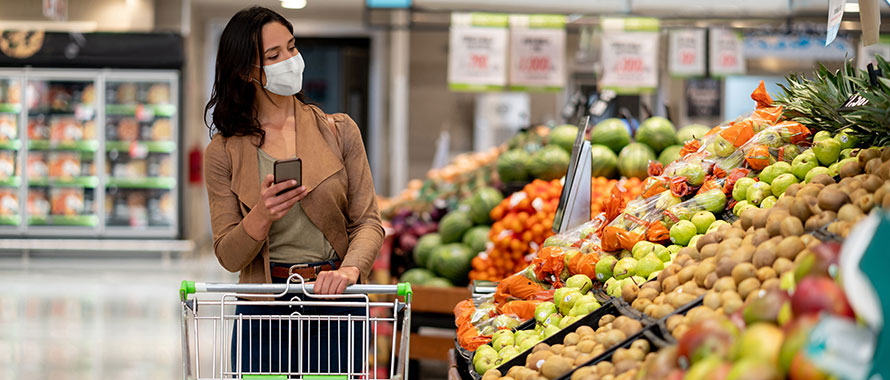The family of a 70-year-old man who died of COVID-19 complications is suing his employer after he was allegedly prohibited from wearing a face mask at work. Gerardo Gutierrez was employed at a Publix grocery store in Miami Beach, Florida when he was infected with coronavirus in early April. At that time, Publix had mask-wearing restrictions in place for workers in its deli, meat and seafood departments.
In a lawsuit filed on November 23, Gutierrez’s family alleges that the store’s mask policy led to his death. The suit also claims that social distancing was not possible in the deli department and that the father of four tested positive for COVID-19 after working with a sick colleague who was not sent home when she began showing symptoms. Publix instituted a policy that all employees must wear a face mask on April 20, weeks after other grocers had implemented similar policies.
“A company has a responsibility to do its best to provide a safe and healthy work environment,” said Heather Schaaf, Underwriting Director, Burns & Wilcox, Chicago, Illinois. “Prohibiting mask wearing could be perceived as not acting in the best interest of employees.”
The case is among a growing number of wrongful death suits being filed in the U.S.1 as the pandemic rages, providing a grim reminder for employers of the urgency to implement robust safety protocols and review relevant insurance policies. Business leaders are also looking closely at state liability shields2 and Senate Bill 4317 (the SAFE TO WORK Act), a stalled U.S. Senate bill that would provide legal immunity for companies sued by employees for issues related to COVID-19.3
“If S.B. 4317 is passed it could definitely impact cases like the Gutierrez family’s,” Schaaf said.
Mismanagement and D&O Insurance coverage
Although Gutierrez’s death occurred during the early days of the pandemic in the region in which he worked, the state of Florida did recommend the wearing of face masks at the time he fell ill.
“Corporations can be deemed responsible for making employees aware of state and local regulations,” Schaaf said. “Failing to do so or follow such guidelines could result in lawsuits like the one filed against Publix.”
Those factors are of utmost importance when it comes to determining liability and how and whether a company’s insurance coverage applies to a given event. If mismanagement occurred, coverage could be available under a Directors & Officers (D&O) Insurance policy, which covers a company’s directors and officers in the event they are named in a lawsuit. These individuals are held to a certain standard of care, Schaaf said. “If they fail in their duty to meet that standard, they could be eligible to file a D&O Insurance claim,” she said.
For example, if a state mandated that employers provide personal protective equipment and a company chose not to implement this practice or did not enforce the policy consistently, a D&O Insurance claim for oversight or mismanagement coverage could be made, Schaaf said.
“Distinctions are unclear when it comes to mismanagement,” she explained. “Given that the pandemic is widespread and is now resurging, it is conceivable that not implementing related guidelines could be deemed mismanagement, which would fall under a D&O Insurance policy rather than a Workers’ Compensation or Commercial General Liability (CGL) Insurance policy.”
Wrongful death lawsuits are not typically covered by D&O Insurance or Employment Practices Liability Insurance (EPLI) due to bodily injury and death exclusions; nevertheless, some D&O Insurance policies have a coverage carve-back for bodily injury, Schaaf said. Coronavirus-related liability lawsuits could also trigger CGL Insurance or Workers’ Compensation Insurance. While there can be some crossover between coverages, these policies generally contain clauses to dictate the circumstances under which coverage applies.
“This really helps to put insurance coverage in its proper lanes so that the correct policy is responding to each claim,” Schaaf said.
Recent wrongful death lawsuits involve grocery, transit workers
Since the pandemic began, at least 131 grocery workers have died of COVID-19 in the U.S.4 In Canada, 500 food-retail and pharmacy employees had tested positive for the virus by May and several had died from the disease.5
One of the first wrongful death lawsuits related to the virus was filed against Walmart in April by the family of a 51-year-old overnight stock associate who died of coronavirus complications on March 25.6 According to the lawsuit, the Chicago area store failed to properly respond to virus symptoms among its workers, did not provide employees with personal protective equipment and did not enforce appropriate distancing.
Thus far the Chicago case has not progressed in the court system, although at least one other employee of that same store is also believed to have perished from coronavirus.
On October 22, the widow of a New Jersey Transit train conductor filed a wrongful death lawsuit alleging that her husband died of COVID-19 because his supervisors did not follow established safety measures.7 The lawsuit accuses the transit company of failing to comply with state and federal coronavirus guidelines, including social distancing and the use of masks.
“In cases where management oversight is a potential factor, D&O Insurance policy coverage could apply, barring an absolute bodily injury exclusion,” Schaaf said.
One potential hurdle of these lawsuits could be proving whether or not an employee was definitively exposed to the virus while at work. In cases involving Workers’ Compensation Insurance, the state of California has enacted a “rebuttable presumption”8 that COVID-19 is a work-related injury. “What the California law has done is put the onus on the employer to prove that a worker was not exposed or infected with coronavirus at work, versus putting it on the employee to prove that he or she was,” Schaaf said.
Small businesses not immune from lawsuits
Since March, more than 1,200 lawsuits have been filed against employers alleging labor and employment violations related to COVID-19, according to Schaaf. Though settlements have not yet been reached, businesses could face considerable legal costs if sued.
“If an entity or its directors and officers are named in a lawsuit, the cost of defending those individuals or the entity falls under a D&O Insurance policy’s coverage,” she said. “It would not need to be proven that it is a covered loss. This is invaluable, because professionals who specialize in this type of law can be engaged immediately.”
Throughout the pandemic, coronavirus-related restrictions have varied by state, city or province. Keeping up with changing legislation can be a challenge for small business owners, who are also facing reduced revenue, Schaaf said. Still, these businesses are just as susceptible to a lawsuit as a larger company. In fact, 1 in 4 private companies will face a D&O or EPLI lawsuit at some point, she pointed out.
“Odds are there will be some type of allegation made against a company, and it will need the coverage for defense that a D&O or EPLI policy provides, which can be hundreds of thousands of dollars, even if no wrongdoing is demonstrated,” Schaaf said. “That could force a small business with thin margins and low revenue into bankruptcy.”
In addition to reviewing D&O Insurance policy coverage, small business owners should ask their insurance broker or agent about standalone EPLI, versus a policy packaged with CGL Insurance, Schaaf recommended. “Standalone EPLI policy coverage limits are higher and the coverage language is broader,” she said. “Most small companies need at least $1 million in this type of coverage.”
Business owners should also inquire whether their D&O Insurance policy contains bodily injury exclusions. “While companies will likely be unable to avoid such exclusions, it is important that they are aware of their existence,” she said.
Written pandemic plans help mitigate risks
To help mitigate workplace risks, all employers should have a written pandemic plan and processes in place to remain current on federal, state and local agency recommendations. In addition, existing policies, work-from-home guidelines and employee handbooks should be reviewed and updated regularly, Schaaf emphasized.
Companies should also be ready to comply with health-related orders that require employees to work from home whenever possible. Employers that choose not to comply with such orders could be opening themselves up to liability, Schaaf said. “If companies are still requiring employees who could work from home to report to the office when local government has suggested strongly that such employees should be working from home, that might create potential legal challenges for those companies.”
Prohibiting employees from working at home could also lead to claims under the Americans with Disabilities Act if, for example, a worker requests an accommodation due to an underlying health condition and it is not met. Coverage for ADA-related lawsuits would typically fall under a company’s EPLI policy, Schaaf said.
At this point in the pandemic, a lack of preparation will likely not be an acceptable defense for a company, Schaaf said. “Every company should have a plan in place by now,” she said, adding that “flawed plans should be swiftly amended or replaced.”
The question of negligence is always critical in discussions over liability, Schaaf said. “It has been over eight months since the pandemic began in the U.S. If a company does not have reasonable plans in place to make sure it is doing the best it can for its employees, staff and customers and is not contributing to the spread of disease, that company could be at risk for being accused of negligence,” she said.
Sources 1 Adamy, Janet. “Families File First Wave of Covid-19 Lawsuits Against Companies Over Worker Deaths.” Wall Street Journal, July 30, 2020. 2 Dowdell, Paul. “Immunity from Liability in the Age of COVID-19: A New Reality for Trial Lawyers?” American Bar Association, August 31, 2020. 3 Musto, Julia. “Senate GOP's SAFE TO WORK Act may be crucial point in stimulus talks.” FOX News, September 8, 2020. 4 Bhattarai, Abha and Christopher Ingraham. “Workers call on Walmart, Amazon and other retailers to bring back hazard pay ahead of holiday rush.“ Washington Post, November 23, 2020. 5 Blackwell, Tom. “Hundreds infected, several dead: How COVID-19 has affected the unsung essential workers in retail.” National Post, May 23, 2020. 6 Selyukh, Alina. “Walmart Faces Lawsuit Over Worker’s Death From Coronavirus Complications.” NPR, April 7, 2020. 7 Attrino, Anthony G. “NJ Transit train conductor died from COVID-19 due to lack of safety measures, his widow says in suit.” NJ.com, Advance Publications, November 3, 2020. 8 Luna, Taryn. “California makes it easier to receive workers’ comp for coronavirus claims.” Los Angeles Times, May 6, 2020.





